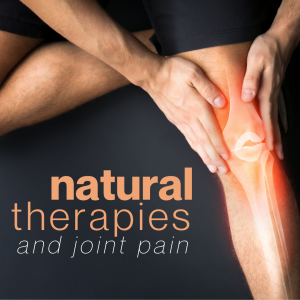
If you’ve ever suffered from joint pain, you know how much of a headache it is. All the aches and pains of arthritis make moving your joints unnecessarily difficult, and the prospect of your symptoms worsening over time is daunting, to say the least.
What if I told you there are therapies available that are both natural and effective?
In this article, we’ll take a look at what the latest research says about supporting arthritis naturally.
What is Arthritis?
There are a number of reasons arthritis can develop: from autoimmunity to gout, infectious bacteria, and even Lyme disease... the list goes on, and there are as many varying symptoms as there are causes.
Today, we’ll focus on the two main categories of arthritic pain:
● Autoimmune
● Degenerative
Autoimmune Arthritis
Autoimmune arthritis is what we see in Rheumatoid Arthritis, Psoriatic Arthritis, and Lupus.
These conditions are systemic — meaning the entire body is affected. Inflammation courses throughout the body and disturbs the delicate joint cavity. Often, the body’s own immune system malfunctions and directs excessive inflammation to the joints.
Antibodies Attack Your Own Tissues
In rheumatoid arthritis, an auto-antibody (called rheumatoid factor) is created which mistakenly attacks one of the body’s natural antibodies: IgG. Only a portion of IgG is targeted, but it leads to a larger problem: cross-reactivity - an antibody attack on your own tissues.
Once this auto-antibody attack has occurred in the body once, rheumatoid factor can no longer distinguish between IgG and the synovial membrane of the joint. As a result, the joint itself will be slowly destroyed.
How Autoimmune Arthritis Progresses
Autoimmune types of arthritis often affect joints symmetrically (meaning both sides of the body are equally affected). This chronic disease leads to pain, stiffness, swelling, and limited range-of-motion in multiple joints. But it may start slowly with just a few small joints - stiffness in the hands is a typical early symptom.
If you have autoimmune arthritis, it’s important to work closely with your healthcare team to obtain a diagnosis and develop an ongoing maintenance and prevention plan. Some arthritic conditions, such as systemic lupus erythematosus (SLE), can be life-threatening.
Degenerative Arthritis (aka Osteoarthritis)
Degenerative joint disease — or osteoarthritis — is the most common disorder of the joints, occurring in about 10% of people over the age of 60.
Why Do Some People Develop Osteoarthritis?
Previous Joint Issues
Often considered an “inevitable” part of aging, osteoarthritis is a bit of a misnomer. While there is inflammation (hence the “-itis”), the inflammation occurs after joint damage or in a naturally malformed joint.
Metabolic Conditions
Most people suffering from osteoarthritis typically have no precursing conditions. It can, however, develop as a result of metabolic disorders (such as diabetes).
How Does OA Attack the Joints?
The wear and tear seen in degenerative joint disease targets the “hyaline cartilage”, which is there to ensure friction-free movement and proper dispersal of weight across the bone.
Protective chondrocytes
For years, this damage is mitigated by chondrocytes. These helpful little cells replace the worn-out cartilage with fresh, strong hyaline cartilage. As we age, however, it’s hard for them to keep up.
Conventional Treatments for Osteoarthritis Increase Degeneration
It’s common for doctors to prescribe NSAIDs (non-steroidal anti-inflammatory drugs) for arthritic pain. Unfortunately, these NSAIDS prevent chondrocyte formation — this only exacerbates the loss of cartilage.
So what other therapies are there to treat arthritis?
We’re glad you asked!
Supporting Arthritis with Naturopathic Medicine
While conventional treatment options for your arthritis may differ depending on whether it’s autoimmune or degenerative, some natural therapies prove helpful regardless of the type of arthritis causing the pain. We’ll go over a few of these today.
Arthritis is different for everybody, and every body is unique, so make sure you talk to your naturopathic doctor to determine which options are best for you.
Herbal Support for Arthritis
Anti-inflammatory Herbs
We can’t emphasize the impact inflammation has on arthritis enough. So how do we prevent further joint degeneration by inflammation? One of the most well-researched anti-inflammatory herbs is... (drum-roll please) — Turmeric!
Turmeric
Turmeric, or Curcuma longa, has a well-established track record for fighting inflammation in the body. But the bioavailability of turmeric (how much enters the circulation and thus affects the body) is often poor.
Fortunately, recent research indicates how to get the biggest bang for your buck. You’ll want to take a nano-particle turmeric supplement. Your naturopathic doctor can help you find the right version.
Analgesic Herbs
Analgesic medications relieve pain. The same is true of botanical analgesics which come in all shapes and sizes.
Cayenne Pepper
Topical analgesics can be extremely helpful for your arthritic pain. One prominent botanical is cayenne pepper. Often delivered as a salve, cayenne pepper can be rubbed onto the skin over sore joints.
Essential Oils
Wintergreen, camphor, and eucalyptus also make excellent topical analgesics. The volatile oils in these herbs absorb easily through the skin and have been researched for their effectiveness in reducing pain.
CBD
One increasingly popular analgesic botanical is cannabidiol (or CBD). This non-psychoactive compound is a close cousin of THC. Found in cannabis and hemp, CBD is particularly effective as a topical analgesic for joint pain (especially in rheumatoid arthritis).
Navigating the new world of CBD products can be daunting for some. Feel free to reach out to your naturopathic doctor for help.
While pain relief doesn’t address the underlying cause of your arthritis, it can help you get back on your feet and into the world you love.
Hydrotherapy
Speaking of pain relief, one fast-tracked route to happier joints is hydrotherapy.
Hydrotherapy uses contrasting water temperatures to circulate blood and lymph throughout the body. Warm water is a vasodilator: it relaxes blood vessels (which lowers blood pressure). Cold water, on the other hand, is a vasoconstrictor: the blood vessels narrow and pressure jumps.
By alternating the water temperature, the blood vessels around your joint first relax and dilate, and then quickly (under cold water) tighten and constrict. By repeating this back-and-forth, you can effectively flush the blood, lymph, and inflammation that has accumulated around the joint.
How to Get Started with Hydrotherapy at Home
The technique is very simple.
Place your painful joint under the faucet or showerhead. Start with warm water (enough heat to make your skin pink). Once the skin shows a flushed tone, switch the temperature to cold — as cold as you can handle. Blast the chilly water for 20-30 seconds.
That’s all there is to it!
Repeat the warm-cold sequence for about two minutes. You may find yourself at the faucet several times a day. It’s quick, free, and easy to do when you’re in pain.
Lifestyle Factors That Can Support Arthritis
More than ever before, researchers are uncovering direct links between auto-immune conditions and gut health.
Gut Health
Recent studies on rheumatoid arthritis reveal changes in the gut microbiome (the diverse bacteria in our GI tract). Two species in particular show specific alterations in RA. The Haemophilus species are depleted, while the lactobacillus salivarius species are over-represented.
What do these changes mean?
In cases of auto-immune arthritis, it means that the gut microbiome may be involved in the development of the condition. This can translate into actionable therapeutic options in light of other recent studies.
Probiotics & the Microbiome
The use of probiotics to alter the gut microbiome, for example, is a hot topic in the health community.
Probiotics have shown therapeutic benefits for rheumatoid arthritis. Comprised of tiny exogenous bacteria, probiotics have immune-modulating effects (helping the immune system function appropriately) and can help decrease inflammation. Talk to your ND to see if probiotics are a sensible option for you.
Reducing Arthritis Triggers With an Elimination Diet
Along a similar vein, let’s examine elimination diets.
If you have autoimmune conditions, your food sensitivities can affect the overall reactivity of your immune system. The idea is that by identifying and removing food triggers, your immune reaction (read: inflammation) may decrease.
You can start an elimination diet with the help of your naturopathic doctor. Your ND can give you a list of foods that are potential triggers. You’ll stop eating these for a while, and then (one by one) re-introduce each food. Any sensitivity or reaction is noted and addressed.
Food Sensitivity Testing
Your naturopathic doctor may decide to order food-sensitivity tests as well, which can provide you with a list of potential suspects unique to you which may not be on the list of typical trigger foods.
Some foods are easier to avoid than others. A diet plan can help you find the right recipes and natural ingredients to help you enjoy your meals while reducing the risk of an overactive immune response.
The Role of Exercise In Arthritis
When you suffer from joint pain, exercise and physical movement can be rather difficult. But remaining physically active is an important component for your overall health. It is important to try and stay active even with arthritis.
If you experience a flare-up of your arthritic pain, scale back your daily exercises. No harm, no foul.
Functional Movement
Functional exercise trains the body for the everyday movement and activities performed in real life and boasts many benefits for arthritis. It can delay Rheumatoid Arthritis disease development, according to recent studies. These exercises also enhance joint function and reduce painful joints, including morning stiffness.
Rest
In general, rest helps swollen and inflamed joints. If you feel fatigued, it’s also important to rest and recuperate. However, during these times, gentle range-of-motion (ROM) exercises help keep your joints flexible.
Final Takeaway
As you can see, there are many natural ways to support your body when suffering from arthritis. You have options! Naturopathic and lifestyle therapies have been shown to offer significant, medication-free relief for those dealing with arthritis. Use caution when starting a new regimen even with natural therapies, it’s always best to work with a professional for guidance specific to your unique body and health issues.
Your Naturopathic doctor can help you find solutions for your arthritis. Acupuncture, laser therapy, and even liver support may all play a role in your individualized treatment plan. Reach out for more details today!
References:
Daily JW, Yang M, Park S. Efficacy of Turmeric Extracts and Curcumin for Alleviating the Symptoms of Joint Arthritis: A Systematic Review and Meta-Analysis of Randomized Clinical Trials. J Med Food. 2016;19(8):717-729. doi:10.1089/jmf.2016.3705
Mohammed AT, Khattab M, Ahmed AM, Turk T, Sakr N, M Khalil A, Abdelhalim M, Sawaf B, Hirayama K, Huy NT. The therapeutic effect of probiotics on rheumatoid arthritis: a systematic review and meta-analysis of randomized control trials. Clin Rheumatol. 2017 Dec;36(12):2697-2707. doi: 10.1007/s10067-017-3814-3. Epub 2017 Sep 15. PMID: 28914373.
Wang L, Gao C, Zhu D, Chen LH. [Effect of functional exercises on patients with rheumatoid arthritis: a meta-analysis]. Beijing Da Xue Xue Bao Yi Xue Ban. 2018 Dec 18;50(6):991-997. Chinese. PMID: 30562770.
Zhang X, Zhang D, Jia H, Feng Q, Wang D, Liang D, Wu X, Li J, Tang L, Li Y, Lan Z, Chen B, Li Y, Zhong H, Xie H, Jie Z, Chen W, Tang S, Xu X, Wang X, Cai X, Liu S, Xia Y, Li J, Qiao X, Al-Aama JY, Chen H, Wang L, Wu QJ, Zhang F, Zheng W, Li Y, Zhang M, Luo G, Xue W, Xiao L, Li J, Chen W, Xu X, Yin Y, Yang H, Wang J, Kristiansen K, Liu L, Li T, Huang Q, Li Y, Wang J. The oral and gut microbiomes are perturbed in rheumatoid arthritis and partly normalized after treatment. Nat Med. 2015 Aug;21(8):895-905. doi: 10.1038/nm.3914. Epub 2015 Jul 27. PMID: 26214836.


